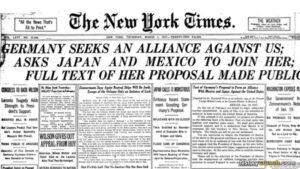The assassination of Franz Ferdinand was one of the most significant events of the 20th century, because it was the event that began World War I. Franz Ferdinand was the Archduke of the Austro-Hungarian Empire and the heir apparent to replace Franz Joseph. His assassination (along with the long-term causes of World War I) on June 28th in 1914 plunged Europe into the events of World War I. World War I was a major conflict that began in 1914, and is considered to have five major causes that led to the outbreak of the war. These five causes include four long-term causes (militarism, alliances, imperialism and nationalism) and one short-term cause (the assassination of Franz Ferdinand). The four long-term causes each occurred in the years and decades before the actual outbreak of World War I, whereas the assassination of Franz Ferdinand is considered to be the short-term event that sparked the immediate outbreak of the war.

WHY WAS FRANZ FERDINAND ASSASSINATED?
As stated above, Franz Ferdinand was the Archduke of Austria-Hungary and the heir to the Austro-Hungarian throne in the years before World War I. Ferdinand and his wife Sophie were assassinated on June 28th, 1914 in Sarajevo, the capital of the Austro-Hungarian province of Bosnia and Herzegovina while there on a visit to inspect the military forces. The assassin was a Serbian nationalist named Gavrilo Princip. Just nineteen years old at the time, Princip was a member of the Black Hand. The Black Hand was a Serbian nationalist organization that existed in the early part of the 20th century. The Black Hand was first created in August of 1901, by members of the Royal Serbian Army. It was a secret society that worked to promote Serbian nationalism. They were opposed to Austro-Hungarian influence in the Balkans, which was the name for the southeastern region of Europe. As such, the Black Hand planned to assassinate Franz Ferdinand as a form of protest towards Austria-Hungary.
Serbian nationalism grew stronger in the years leading up to 1914 and the outbreak of World War I. For instance, the Bosnian Crisis of 1908 was an important event in the Balkans that increased tensions. In general, the Bosnian Crisis involved the annexation of Bosnia and Herzegovina by Austria-Hungary. This means that Austria took control over the two territories. Previously they had been controlled by the Ottoman Empire but by this time the Ottoman Empire was in decline and losing its authority in the region. Austria’s annexation of Bosnia and Herzegovina created a crisis not only with the leadership of the Ottoman Empire, but also with other surrounding European nations including Italy, Russia, and Serbia. In fact, Serbian nationalists (like those in the Black Hand) resented the Austro-Hungarian takeover of Bosnia and Herzegovina. This created lingering anger among the members of the Black Hand, who wanted to unify and liberate Slavic people in the Balkans.

THE ASSASSINATION OF FRANZ FERDINAND
Upon first arriving in Sarajevo, Franz Ferdinand and Sophie made their way through the city in a motorcade. Members of the Black Hand had pre-planned their assassination of the Archduke in anticipation of his visit to Sarajevo. As the Archduke’s motorcade made its trip, a member of the Black Hand attempted to assassinate the couple with a bomb that was thrown at the couple’s car. The bomb missed Franz and Sophie and injured members of the car behind them when it exploded. After a short rest at the Governor’s house in Sarajevo, Franz decided to visit the people injured by the earlier bombing by going to the hospital. The drivers of the motorcade were not made aware of the change in plans and as a result the drivers took the wrong route.
By the time the error had been discovered the drivers had to turn around and began to slowly back up down a street in the center of Sarajevo. By coincidence, Gavrilo Princip was on the street at that time and noticing his opportunity he approached the cars and fatally shot both Franz and Sophie with his pistol. Franz and Sophie were dead and the members of the Black Hand that carried out the attack were rounded up and arrested.

While he was being arrested for the assassination of Franz Ferdinand, Princip tried to shoot himself, but ultimately failed. Shortly after, he was quickly put on trial and sentenced to twenty years in prison. His time in prison was difficult, and he suffered extremely poor treatment. For instance, he struggled with malnutrition and tuberculosis while in prison. He died on April 28th in 1918.

SIGNIFICANCE OF THE ASSASSINATION OF FRANZ FERDINAND
The assassination of Franz Ferdinand and his wife Sophie caused the nationalistic tensions of the Balkans to spill over and the event is considered to have directly led to the outbreak of World War I. In fact, the assassination of Franz Ferdinand was a direct cause of the ‘July Crisis of 1914’, which saw tensions escalate between the major European powers to the point that it resulted in World War I. For instance, the July Crisis of 1914 was the immediate result of the assassination and saw Europe divided along the two major series of alliances (Triple Entente and Triple Alliance). A month after the assassination, World War I had begun. As such, the assassination of Franz Ferdinand was a vitally important event that changed the course of history in the early 20th century.
CAUSES OF WORLD WAR I – INFOGRAPHIC




